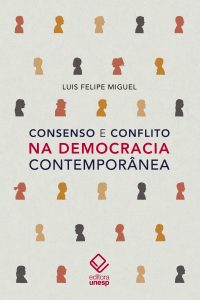Luis Felipe Miguel discusses consensus and conflict in a contemporary democracy
Political scientist goes in the opposite direction from those who accept the rupture between realism and criticism in the current theory

Almost 30 years after the fall of the Berlin Wall, the world seems to move away from the most optimistic prophecies – and desires – of analysts who foresaw a universalizing democracy and freedom. In this scenario, we must look closely at the pillars of the democratic regime, such as notions of consensus and conflict, central themes raised by Luis Felipe Miguel in Consensus and conflict in contemporary democracy [Consenso e conflito na democracia contemporânea], published by Editora Unesp.
“This book was born out of the nonconformity with the split between realism and criticism in contemporary political theory”, the author writes. “It is a sweet, naive and, in a limited way, incompetent vision of politics to understand and promote interventions in the world”.
Along the seven chapters, the book starts the discussion by recovering the concepts of conflict and interest and emphasizing how the inequalities of the “social world” directly influence democracy. He criticizes “a growing disregard for the democratic quality of political institutions, particularly representation, even in the most progressive fringes towards the theoretical thought”.
The book also brings reflections on inequality and representation, on the figure of the representative as a protector – written letters to Janio Quadros and Getúlio Vargas, important representatives of this current, are analysed – as well as the concept of oligarchy and representation as thought by such different authors like Robert Michels and Pierre Bourdieu and their “pessimisms”. There is a reflection about the irreconcilable consequences for democracy of a split society marked by material contrasts.
Finally, Miguel approaches and discusses possible utopias of post-socialism, the alternatives for a capitalist system in crisis. Readers can face a rich and complex panorama, from which they can observe more clearly the directions of political theory in the current democracy.

About the author – Luis Felipe Miguel is a full professor at the Institute of Political Science of the University of Brasília, where he coordinates the Research Group on Democracy and Inequalities (Demodê). He published, with Editora Unesp: Convex kaleidoscope: women, politics and media (coauthored with Flávia Biroli, 2011), Democracy and representation (2014) – awarded by Anpocs for Best Scientific Work in 2015 – and Inequalities and Democracy (as organizer, 2015).
Title: Consensus and conflict in contemporary democracy [Consenso e conflito na democracia contemporânea]
Author: Luis Felipe Miguel
Number of pages: 215
Format: 14 x 21 cm
ISBN: 978-85-393-0679-4
Rights: worldwide free
